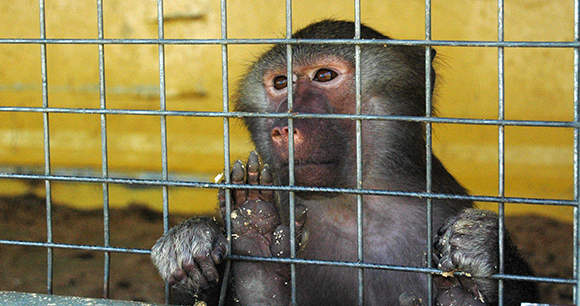
Washington, DC—The Animal Welfare Institute (AWI) welcomes the reintroduction today of the Animal Welfare Enforcement Improvement Act (AWEIA) by Reps. Raja Krishnamoorthi (D-IL) and Nancy Mace (R-SC). This bill (H.R.3859) would protect animals from unscrupulous dealers and exhibitors, and close existing loopholes in the US Department of Agriculture licensing process that endanger animals and allow chronic violators to escape accountability.
The AWEIA would end the USDA’s practice of renewing exhibitor and dealer licenses even when licensees have long histories of failing to comply with the Animal Welfare Act (AWA), the primary federal law ensuring humane care of animals used in commercial enterprises.
In the past, the USDA routinely rubber-stamped license renewals. Under a new regulatory scheme instituted in 2020, animal dealers, breeders, and exhibitors—including large-scale commercial dog breeders, traveling circuses, roadside zoos, petting farms/zoos, animal acts, animal rides, exotic wildlife operations, and marine mammal facilities—are required to obtain a license only every three years upon passing a pre-announced inspection, and they are allowed up to three opportunities to pass.
Unfortunately, this system allows habitually out-of-compliance licensees to clean up just long enough to pass the scheduled inspection and remain licensed—even if unannounced inspections in between these scheduled inspections reveal violations.
In one stark example, hundreds of dogs bred for experimentation died at an Envigo facility in Cumberland, Virginia, yet the USDA failed to confiscate the remaining animals and even renewed the license for Envigo's parent company, Inotiv.
“For far too long, the USDA has failed to adequately enforce the Animal Welfare Act, allowing businesses to continually mistreat animals,” said Susan Millward, AWI’s executive director and CEO. “The situation has further deteriorated in the last several years, even as high-profile cases such as Envigo, which necessitated the rescue of 4,000 beagles, have brought unprecedented public attention to the activities of breeders licensed under the AWA. The USDA needs to stop allowing facilities to remain persistently and egregiously out of compliance and start taking action sooner—not merely after a case becomes highly publicized.”
In another case, involving notorious Iowa dog breeder Daniel Gingerich, the US Department of Justice had to intervene before the USDA acted to permanently revoke Gingerich’s license—despite USDA inspection records documenting shocking abuse.
“The Animal Welfare Act remains essential legislation for guaranteeing the treatment and care of animals, but it only works when it is enforced,” said Krishnamoorthi. “The Animal Welfare Enforcement Improvement Act will ensure that the law is properly enforced by closing longstanding loopholes that allow businesses that mistreat animals to continue to do so.”
"As strong advocates for animal welfare, the Animal Welfare Enforcement Improvement Act is a crucial step towards protecting our furry friends,” Mace said. “Requiring annual license renewal ensures the individuals responsible for caring for animals are held accountable and remain committed to upholding the highest standards. By preventing license holders with repeated violations from renewing their licenses without additional oversight, we will prioritize the well-being of animals and guarantee those entrusted with their care are held to the highest level of responsibility. Furthermore, the act's provision for revoking licenses in cases of repeat violations that harm animal well-being serves as a powerful deterrent against any neglect or mistreatment, ensuring a safer and more compassionate environment for all animals."
The bill would require animal dealers and exhibitors to improve their veterinary care standards and renew their licenses annually, with each renewal contingent on passing an unannounced inspection by the USDA. Businesses determined to be noncompliant with the minimum care standards of the AWA, or that have repeatedly violated the AWA or local, state or other federal laws related to animals, would be denied licenses. Further, the USDA could permanently revoke a license (following a hearing) when a dealer or exhibitor has committed multiple animal welfare violations; such businesses would be barred from receiving a license under another business name or business partner.
Marjorie Fishman, Animal Welfare Institute
[email protected], (202) 446-2128
The Animal Welfare Institute (awionline.org) is a nonprofit charitable organization founded in 1951 and dedicated to reducing animal suffering caused by people. AWI engages policymakers, scientists, industry, and the public to achieve better treatment of animals everywhere—in the laboratory, on the farm, in commerce, at home, and in the wild. Follow us on Facebook, Twitter, and Instagram for updates and other important animal protection news.